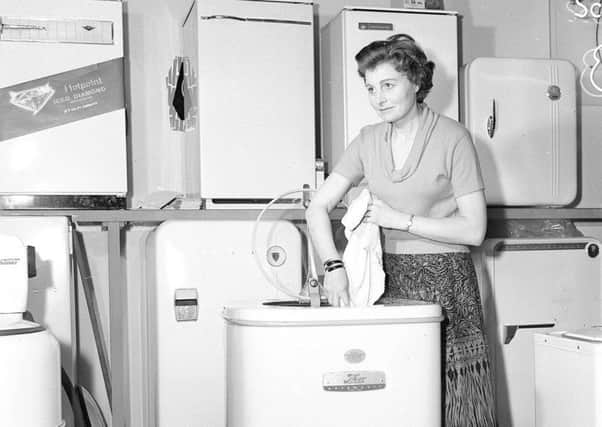Jim Duffy: The demise of '˜women's work' '“ a hen do's verdict on sexism


I recall my time in the Polis, when I must have met some of the most bigoted and sexist men I had ever come across.
Gladly, they were a minority. But they existed nonetheless and some of the ideas that spewed forth from their mouths did make me wonder what planet they were on.
Advertisement
Hide AdAdvertisement
Hide AdOne common phrase at the time – 20 years ago – referred to house work such as washing dishes, making beds, vacuuming, ironing, cleaning toilets and laundry etc. Some of my older colleagues called this “women’s work”.
I’m pretty sure that the politically correct police services we have now in the UK are a result of the dinosaurs I worked with at the time. The reaction to male-oriented canteen culture that pervaded the muster rooms at the time has come full circle I would guess. Perhaps some female police officers may beg to differ? But, looking back makes me think about “women’s work” these days and what has changed.
What a better way to understand this than to host a Hen Do at my house. In essence, they would form a ‘research group’ that I could put questions to about men, chores and 21st century attitudes. My findings were interesting and illuminating and not what I had expected at all.
It was agreed by my “respondents”, that women had the majority of home chores to do 20 years ago. Some of this was down to it simply being a norm, inherited from their mothers and grandmothers, while some of it was foisted upon them as a necessity due to their partners’ lack of interest in all things cleaning.
It seems women who brought up families while the men went out to work in the steelworks, dyeworks and mills, were more likely to doing the house chores. I believe the American up-to-date, progressive term for this genre of female is ‘homemaker’, albeit, my mum would have used the word “skivvy” at times.
But, does the homemaker of today choose to be so or do the chores get shared equally?
In between the karaoke and shots, I was able to interrogate my research group looking for empirical evidence as well as circumstantial, anecdotal tales. I found no-one in my sample to be anti-men as far as the chores were concerned.
It seems that men today who are in relationships and live with their female partners do not hold the same views as some of my old police colleagues. A big thumbs up for progress then. But, each relationship was different and not a carbon copy of the other.
Advertisement
Hide AdAdvertisement
Hide AdFinding number one: It seems that if a man’s mother worked with him to show him how to complete the housework, then he was better and more productive in the home today.
Mothers who showed their sons and daughters how to use the washing machine, how to iron a shirt and how to clean a sink gave their offspring the tools necessary for living a better life. This schooling in domestics provided a solid platform for living alone and living with a partner.
So far so good. But, what about those men who were not shown the ropes?
Finding number two: Well, it seems that if yer mammy didn’t show you how to programme the washing machine and your daddy didn’t do much around the house, then you are likely to have suffered from that lack of parenting.
One respondent, who at the time was dancing to Michael Jackson’s Thriller while wearing a Russell Brand mask, was pretty clear on why her partner was as good as useless around the house.
In short, he was not shown how to be domestically useful by his mother and instead had a lot done for him.
But rather than take a pejorative view here, the respondent – no names, no packdrill – adopted a common sense view. He doesn’t know what he doesn’t know, so it was up to her to gently highlight this to him and re-train him. Yes, there were times when this caused stress in the relationship, but the positive and enlightening thing to note here is that it was not his attitude that was defective. He did not class housework as “women’s work”, but accepted he had to participate and learn as he goes. Finally, on the outer levels and fringes of my research group, some of the respondents, while still sober, stated that they themselves and indeed their partners suffered from mild OCD and that cleaning helped to calm this while at the same time manifesting itself in cleaning ... if you get my drift. And I could recognise this in my late mum, who when stressed would clean to calm her down a bit.
So, it seems that “women’s work” is no more. The days of women being classed by some men as having to complete all the housework has gone. Good riddance to it. But, while attitudes may have changed, one thing came out loud and clear from my hugely scientific if somewhat opportunistic research. Despite attitudes changing and a levelling of the playing field, parenting is key to the ongoing development of this theme. “Good parenting” means showing children how to be useful around the house, while recognising what needs to be done and when.
Advertisement
Hide AdAdvertisement
Hide AdI think this common-sense approach should be adopted by us all.
Suffice to say, the hen do went off well and all the respondents went to bed late and slept well into the next morning.
I was up early, so as my old mum had taught me well, I got cracking and did three sets of dishes and cleaned up the kitchen. I vacuumed and had the kettle boiled for tea and toast. Thanks mum.
